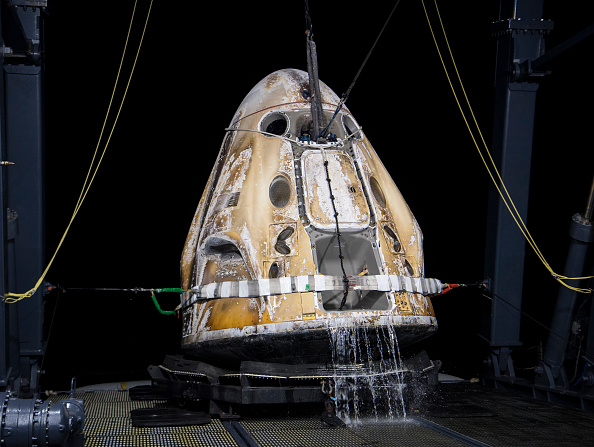Business of Space: The things you can do with a commercial hand

City A.M.’s Millie Turner offers up a roundup of the most important news across the space industry, every Friday.
This week:
- SpaceX deepens commercial ties with NASA
- Artemis: NASA latest stage in returning to the moon
- Space regulations race to catch up with technology
SpaceX and satellite spin-off Starlink
SpaceX brought four astronauts back down to Earth last night, as it deepens its commercial ties with NASA.
A midnight splash down in the Gulf of Mexico saw NASA’s Raja Chari, Tom Marshburn and Kayla Barron, and the European Space Agency’s Matthias Maurer return home after six months in the International Space Station (ISS).
Their return had been marred by worsening relations with Russia, amid its invasion of Ukraine, having left Earth while Roscosmos remained a key player in ferrying astronauts to and from the ISS.
However, the boss of Russian space agency Roscosmos, Dmitry Rogozin, has repeatedly threatened the safety of the ISS in Twitter spats since the war began.
It isn’t the first time SpaceX has reached out a commercial arm in global space affairs.
The rocket company’s spin-off Starlink had shipped a number of satellite connection terminals to Ukraine, to ensure the country had an undisrupted communications during the conflict.
Just yesterday, Starlink unveiled a new feature, for $25 per month, which can see terminals moved temporarily.
The portability feature, while intended to support connection in unreliable areas, will help terminals in conflict areas, such as Ukraine, avoid being sitting ducks for shelling.
NASA: The things you can do with a commercial hand
NASA’s embrace of the commercialisation of space, after decades of pushback, has meant the US agency can channel its focus and capital behind returning to the moon.
The Artemis mission, once complete, will see humans return to the lunar surface for the first time since 1972, which will include the first woman and the first person of colour on the moon by 2025.
The Artemis I mega-Moon-rocket is now gearing up for another attempt of its final prelaunch test in June, according to NASA officials earlier this week.
The 322-foot-tall rocket stack, as well as the Space Launch System and Orion spacecraft, will be rolled to the launchpad at Kennedy Space Centre in Florida later this month.
The wet test, a critical dress rehearsal, simulates every stage of launch without the rocket leaving the launchpad.
The rocket had undergone three rehearsals last month, which highlighted issues for the NASA team to tackle.
Once the rocket stack rolls back out to the launchpad in late May, it will take between 12 and 14 days before Artemis I can go through another wet dress rehearsal, which could occur in early to mid-June, associate administrator for NASA’s Exploration Systems Development Mission Directorate, Jim Free, told a news conference on Thursday.
“We’ve done a lot of work to get the rocket ready to roll back out to the launchpad,” added Cliff Lanham, senior vehicle operations manager for NASA ‘s Exploration Ground Systems Program at Kennedy Space Centre.
“Stopping at the VAB is a pit stop to come back in, do what we need to do and get back out to the pad as quickly as possible. So, we’re working hard to meet that goal.”
Out of this world regulations
Businesses and state agencies are making significant strides in the space industry. However, lawyers have been urging for some time that regulations must develop as quickly as technology.
Legislators in Canada have been working on fresh policy that would see Canadian astronauts who commit crime on the Moon face punishment.
The “Civil Lunar Gateway Agreement Implementation Act” has been added to the country’s 2022 federal budget, which passed its first reading in Canada’s House of Commons at the end of last month.
It comes in preparation of the proposed Lunar Gateway, a small space station planned for lunar orbit, which is hoped to launch in 2024, and feature a solar-powered communications hub, laboratory and short-term habitation module.
The Act covers the Moon, as well as the Gateway and spacecraft, but has been subject to critique for its extending of Canadian criminal law to space.